Nature Conservancy of Canada Interview
eh Interview: Nature Conservancy of Canada (NCC).
“ Each province has its own rich culture and history that you can only really appreciate if you spend some time immersing yourself in these places.” Christine Beevis Trickett
Christine Beevis Trickett
Christine Beevis Trickett from the Nature Conservancy of Canada is our “Friends of Tourism” interview guest this week published on our ‘eh Travel Blog & Online Magazine’ which is part of the eh Canada Travel & Adventure Guide.
Recently… we had the opportunity to chat with Christine Beevis Trickett from our swanky imaginary online studio located in Somewhere Nice Canada. We met online with Christine just days prior to the official November 5th, 2013 launch of their new NCC blog called Land Lines (www.landlines.ca). And, yours truly, is a Guest Blogger!
LandLines.ca is “written by conservation experts and professionals in the field, Land Lines offers a
wealth of cool facts and thought-provoking reads about the Nature Conservancy of
Canada’s cutting-edge conservation research and discoveries”.
The Nature Conservancy of Canada ( http://www.natureconservancy.ca ) has been protecting hectares of the environment since 1962. And to date the NCC has protected over 2.6 million acres from coast to coast. So… we are proud to catch up with them and chat.
The “Friends of Tourism” program is an interview process conducted by eh Canada Travel & Adventure (ehCanadaTravel.com) which introduces you – the reader, friend, follower, traveler – to some of the talented and, generally, good people of Canada we have had the pleasure of working with including non-profits, artists, photographers, gear companies, sponsors, travel bloggers and our supporting tourism advertisers.
We, for one, are excited to hear what they have to say and are grateful to them for all the hard work they do protecting nature and – in many ways – providing us, the traveler, opportunities to meet with nature.
In the interview, Christine shares with us the work of the Nature Conservancy of Canada and her passions for the outdoors and some of her insights into Canada. So…lets get busy and meet with the Nature Conservancy of Canada and find out what they are all about.
(eh Canada Travel) Christine of the Nature Conservancy of Canada thank you for taking the time to visit with us in our swanky imaginary online studio. So lets get the show on the road …
(eh Canada Travel) Who are you and what do you do?
(NCC) My name is Christine Beevis Trickett. I was born and raised in a bilingual family in Toronto, Ontario (my mother is from Quebec, my father from England). As a child and teenager, I was fortunate to spend a lot of time travelling throughout Canada and Europe with my family. Wherever we went, we made sure to go hiking, canoeing, skiing or camping so nature and the outdoors were always a big part of my life.
Now that I’m all grown up, that love of travelling and exploring is still with me. In 2008, my husband and I moved to Halifax, Nova Scotia and spent close to six years there and explored almost every corner of our province (even getting married on the Skyline Trail in Cape Breton Highlands National Park). Then this summer, we moved to Calgary, Alberta. Living in such disparate provinces has been a great way to explore some of Canada’s most beautiful landscapes and get a sense for our country’s diverse and unique local cultures. And for the last seven years, my dad and I have spent time together each summer paddling through lakes and rivers in Ontario, Nova Scotia and BC.
In my day job, my title is the Manager of Editorial Services for the Nature Conservancy of Canada, but I guess you could call me a professional storyteller. I’m responsible for finding, writing and sharing stories about our work. My latest endeavour has been launching our new blog – Land Lines (www.landlines.ca). My job at NCC is a perfect marriage of my lifelong interests in writing and nature.
(eh Canada Travel) What a quality life of culture and adventure you have enjoyed so far. Nicely done.
Waterfalling in the Kootenays
(eh Canada Travel) What is your favourite thing about Canada?
(NCC) How different and unique each province is. Having lived by Lake Ontario, the Atlantic ocean and now the Rocky Mountains, I can truly say that Canada is a place of incredible contrasts and startling beauty that constantly amazes and surprises me. Each province has its own rich culture and history that you can only really appreciate if you spend some time immersing yourself in these places. From Nova Scotia’s South Shore, to Cape Breton, the Matapedia Valley, the Chic Chocs, the French River or the Rocky Mountains, I’ve been lucky enough to experience some of Canada’s most iconic landscapes – and they are so much more spectacular in person than you can ever imagine in photos.
(eh Canada Travel) Having traveled ourselves throughout Canada- west to east, north to south, back and forth – we too are amazed every day at the many natural wonders of our country.
(eh Canada Travel) Tell us something unique about Nature Conservancy of Canada?
(NCC) NCC is unique in many ways, but one of the most telling differences is its non-confrontational, non-advocacy approach to conservation. NCC’s focus is on conserving our country’s natural legacy for the long-term, and we work with governments at all levels, no matter their political stripes, as well as corporations, individuals, landowners and other groups. With 2.6 million acres protected from coast to coast since 1962, it’s clear that this is an approach that works.
(eh Canada Travel) And thank you for all that you do.
(eh Canada Travel) What are you protecting in Canada and why?
(NCC) NCC uses a science-based approach to identifying the places in Canada where the biodiversity in greatest and the threats to that biodiversity the highest. In general that tends to be in the narrow band of land near the southern Canada-U.S. border – the area where most of Canada’s species are found and where human development is the highest. So that’s where we focus our conservation efforts.
Since 2007, under the Government of Canada’s Natural Areas Conservation Program, more than 912,151 acres (369,134 hectares) have been conserved, of which 769,671 acres (311,475 hectares) have been secured by NCC. That’s equivalent to conserving 999 NHL hockey rinks a day (or 266 CFL football fields). The conserved lands protect habitat for 160 species at risk.
(eh Canada Travel) Wow! OK, what is the #1 Reason why protected lands are important to future generations?
(NCC) Every time I go out in nature, I’m thankful that I’m able to work for an organization that helps to conserve these majestic landscapes so that my nephews and my friends’ children, their children and those beyond them can come experience these places. Nature cleanses and restores my spirit. I hope that they can experience the same joy that I feel when I see an eagle soaring overhead or plovers and sandpipers hunting for mud shrimp along the shore, because of the vision of Canadians who believe in the importance of protecting our country’s natural places for the long term.
And there’s the more pragmatic answer, which is that our forests, wetlands, lakes, rivers and prairies are important for our clean air and water. They also provide important habitat for our country’s native species, who themselves have an intrinsic right to survival.
(eh Canada Travel) We view Mother Nature as our employer in so many ways. We are always respectful and grateful to her for that. We are of the belief that Canada’s natural surroundings are the foundation of tourism and the biggest reason people visit Canada. But it is the protecting of our air, land and water which is everything and anything to our future generations. Hence why we like what you do over there at NCC.
Paddle Rivers with NCC
(eh Canada Travel) How do you promote the physical and mental benefits of exploring the outdoors?
(NCC) NCC is a huge proponent of the importance of taking time for nature, because of its physical and mental benefits. Beyond the simple fact that most of NCC’s lands are available for recreational purposes and we encourage everyone to get out and visit them, we offer a Conservation Volunteers program, which is an opportunity for people of all ages to get out into NCC properties and experience Canada’s natural landscapes while lending a hand in priority conservation work. Similarly, our Nature Days program takes school children to visit an NCC property and learn about the species that live in these places and the habitats that support them.
(eh Canada Travel) We love the sounds of this Conservation Volunteers and Nature Days Programs you have going on. We would be interested in knowing more about how we could participate in these programs. We should talk.
(eh Canada Travel) Why should people support protected lands and conservation areas?
(NCC) Canada’s nature is an intrinsic part of our natural identity. When individuals support NCC’s work, through donation, volunteering or other means, they help create a natural legacy for our children and grandchildren. They also help ensure that the countless native species that live in these places have the room they need to thrive and survive.
(eh Canada Travel) Where do you see the biggest challenges in the future for protected lands?
(NCC) Conservation is a long-term effort that takes patience and a view to the future. And while NCC and other conservation groups have made great strides over the last several decades, there is still so much more to be done. If we are going to succeed in our goal of protecting Canada’s natural heritage, we need to continue to build a force for nature that will work with us together to accomplish this vision. We will need an ever-larger force for nature to help us ramp up the pace of conservation in order to match the rapid pace of development as our global human population continues to increase.
And of course one of the biggest threats to biodiversity is the spread of invasive species, according to the International Union for the Conservation of Nature. Thankfully, NCC has a strong team of Conservation Volunteers that is helping us to tackle the spread of these species on our properties, but that’s a job that requires us to be ever-vigilant – it’s a job that’s never done.
(eh Canada Travel) We are proud to be a small part of that growing “force for nature”.
(eh Canada Travel) Please give us some insight on what, you see, as the biggest mistake travelers do when exploring protected lands?
I think many times, it’s easy to forget that although the wilderness is powerful and has been here long before us and will be here long after us, it’s also incredibly fragile and needs to be treated as such. I’ve often seen toilet paper bombs at campsites or entire trees chopped down for firewood that remind me that others have been there. I always try to remember the lesson from my day as a Girl Guide – to leave nothing behind and take nothing away except for memories.
(eh Canada Travel) We too have visited remote sites and easy to access sites littered in beer bottle piles, smashed glass, toilet paper bombs and then there are the fire pits looking like garbage cans. We do our best to pick up after these sad people because it is the right thing to do and it is something we are happy to do so others, who visit after us, can enjoy the area without negative distractions. Plus… Mother Nature deserves better, so please everyone, “leave no trace behind.”
Wow… that was fun. Great answers too! Thank you Christine for your time! And congratulations with the launch of your new blog Land Lines (www.landlines.ca) on November 5th, 2013. We look forward to being a Guest Blogger!
Visit Nature Conservancy of Canada at : http://www.natureconservancy.ca
Friends of Tourism
**********
ehCanadaTravel.com (eh Canada Travel & Adventure) is the largest booking, planning and researching tourism and travel website for Western and Northern Canada currently expanding into Eastern and Atlantic Canada. The EH Team Brothers (Co Founders) also author the eh Canada Travel Blog which was recently awarded “A Top Canadian Blogger” by FlightNetwork.com.
**********

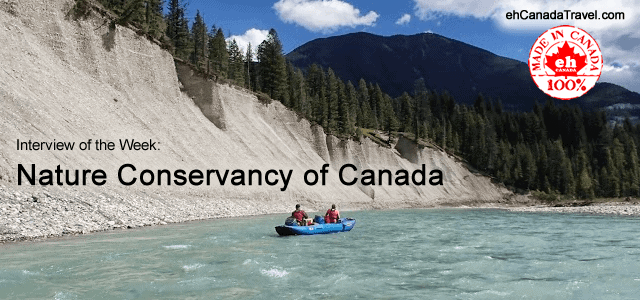

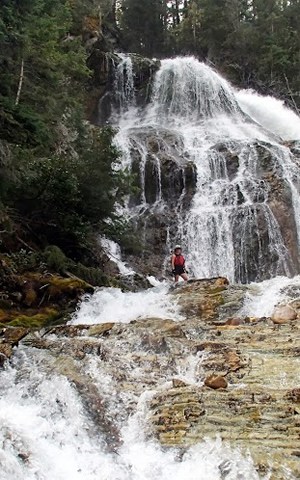
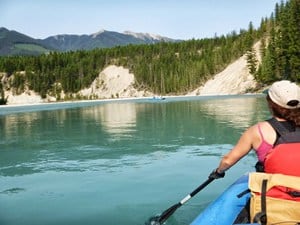


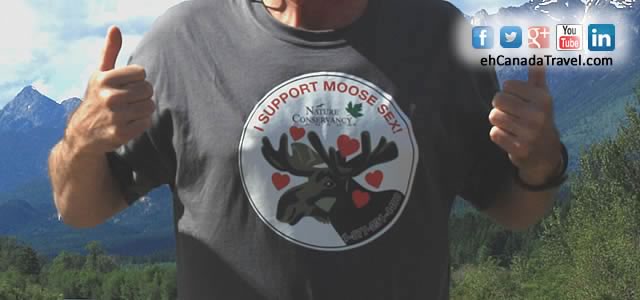


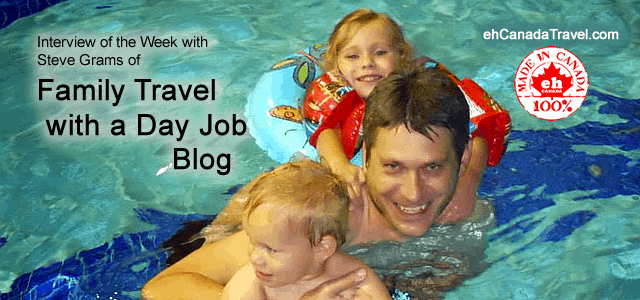

Leave a Reply
Want to join the discussion?Feel free to contribute!